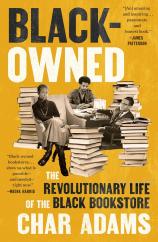Black-Owned: The Revolutionary Life of the Black Bookstore
Review
Black-Owned: The Revolutionary Life of the Black Bookstore
Long before computer algorithms were providing recommendations based on your reading history, there were independent bookstores that offered a personal touch to the transaction between the customer and the retailer. A large portion of the Black-owned stores operating throughout the United States was community-oriented and served as a gathering place for voices wanting to be heard. Currently, there are 130 Black-owned bookstores in the US, though there have been ebbs and flows in those numbers over the last century.
David Ruggles may not have known that he would be a trendsetter when opening the first Black-owned bookstore in the United States, located in Lower Manhattan. Ruggles was a compassionate man who ably assisted fellow Black men and women in learning to read and helped them decipher legal documents. He was an abolitionist who aided many escaped slaves as they traveled north via the Underground Railroad. His activism led to his bookstore being targeted for destruction, but arson wouldn’t deter his resolve, and his establishment would reopen. Despite an untimely death at the age of 39, his spirit would live on in future booksellers.
"This is an enlightening book about progress as much as it is about cultivating a love of reading. Adams has produced an impactful work that should be proudly displayed on many bookshelves."
In 1933, Lewis Michaux established the National Memorial African Bookstore in Harlem. Michaux believed in educating over profits, and he was a proponent of Black nationalism. His business endured for four decades, and when he wasn’t in the store, he was advocating for the rights of Black Americans.
Charlie Cobb was active in the Student Nonviolent Coordinating Committee (SNCC) before opening Drum and Spear in Washington, DC in 1968. He and his partner, Courtland Cox, wanted to promote Black authors from all over the globe. The store built its inventory through wholesalers, assembling an eclectic selection of literature for customers to peruse. In the 1960s, during the age of activism, college students and newly awakened revolutionaries flocked to stores such as Drum and Spear and bought THE AUTOBIOGRAPHY OF MALCOLM X or Mao Tse-tung’s LITTLE RED BOOK.
While bookstore owners like Una Mulzac saw books as tools of revolution, FBI Director J. Edgar Hoover viewed certain Black-owned bookstores as subversive influences and had more than a few placed under surveillance under COINTELPRO, short for Counterintelligence Program. Despite the intimidation tactics employed by Hoover’s G-Men, the owners of the targeted stores didn’t back down.
The success of many Black-owned bookstores was due to enterprising owners who provided books that were frequently missing from mainstream bookstores and chains. Stores like Eso Won Books in Los Angeles carried compelling literature that was occasionally deemed “controversial,” such as THE COLOR PURPLE by Alice Walker. Stores like the Hue-Man Experience in Denver promoted the work of various authors through book readings and signings, which provided another way to connect to the local community. The rise of Amazon and the dawn of digital books have landed a gutshot, yet the customer-friendly experience is not easily replicated. There is no substitute for a business that can function as a museum of knowledge, a shared space to exchange ideas, or a shelter from the storm.
BLACK-OWNED is a truly fascinating history of bookstores owned and operated by African Americans since the 19th century. Whether the store was run by a sole proprietor or a partnership, male or female, they were all united in their community activism and sharing their love of books. Owners faced harassment from authorities, devastation from riots, and financial ruin from gentrification or big-box stores. And while some bookstores were able to withstand many onslaughts, others would be forced to close their doors.
Longtime NBC News reporter Char Adams provides a wealth of information about the numerous stores she cites in her book, whether they are landmark businesses, such as Hakim’s Bookstore in Philadelphia, or those just beginning to make their mark, like BlackLIT, headquartered out of Dallas. This is an enlightening book about progress as much as it is about cultivating a love of reading. Adams has produced an impactful work that should be proudly displayed on many bookshelves.
Reviewed by Philip Zozzaro on November 15, 2025
Black-Owned: The Revolutionary Life of the Black Bookstore
- Publication Date: November 4, 2025
- Genres: History, Nonfiction
- Hardcover: 304 pages
- Publisher: Tiny Reparations Books
- ISBN-10: 0593474236
- ISBN-13: 9780593474235




